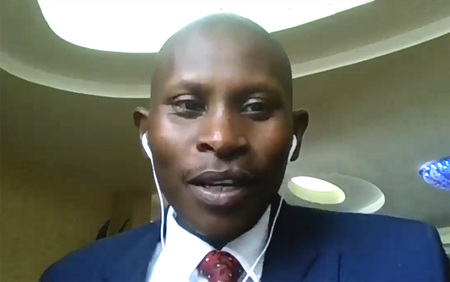In an interview with the Pulte Institute, Ugandan entrepreneur and former Mandela Washington Fellowship for Young African Leaders alum Tushabe “Ronnie” Ronard ’22 ascribed the benefits of innovation training at Notre Dame, saying the University encourages the kind of creativity and problem-solving that lets ingenuity thrive.
Watch Here:

Ronard explains how the executive-style, six-week Mandela Washington Fellowship for Young African Leaders Initiative at the University of Notre Dame—designed to build skills and empower fellows—and later, the IDEA Center’s McCloskey New Venture Competition, set the stage for him to develop new mobile applications that help small business owners keep track of expenses, teachers accelerate student learning, and soccer fans watch matches in real-time.
Lately, Ronard has been working with the IDEA Center’s Director of Student Startups, John Henry, to address the high unemployment rates among Ugandan computer science graduates by teaching coding. Over 80 percent of the country’s unemployed graduates are held back by a skills gap. Coding enables ideas to be translated into functional software, facilitating prototypes that allow stakeholders to interact with concepts and provide feedback.
Ronard recently spoke about his collaborations with the University of Notre Dame. This conversation has been edited for clarity and brevity.
In 2023, you received a Plug and Play Tech Center Award as part of the IDEA Center’s McCloskey New Venture Competition. Tell us about your startup.
I am the founder and director of Empower Youth in Technology. At Empower Youth in Technology, we identify ideas, look at community challenges and understand them, transform these challenges into ideas, and then transform them into solutions. One of our solutions is AccountantApp, which helps small businesses manage financial records using their phone.
In Uganda, small businesses find it hard to get loans from a bank or any investment because they don’t have business records that prove that the company is viable—and that it is making profits. It limits their chances of accessing credit services from financial institutions.
We have incorporated a module in the app where you press a button, and then the app calculates the business performance. It’s a business performance report that you can present to a bank. So, that’s the app I presented in the McCloskey Competition.
It’s been a fantastic opportunity. They have helped us secure servers to host our app, and we are looking for more support from them to hopefully introduce us to others who can invest in our innovation.
You also recently received funding from a collaboration between Private Sector Foundation Uganda and Mastercard Foundation. What did it allow you to do?
One of the innovations we built because of this grant is the EYIT MEDIA app, a platform that brings content creators, people who create videos and shows, together. The app lets you watch local TV in Uganda and listen to radio stations. Things are going digital, and that's why we built this application.
Another innovation we worked on is called the Primary Education Performance Assessment System. It’s for schools in Uganda to keep track of students' performance, enrollment records, and teachers’ attendance rates. It digitalizes records. We are now testing the technology in one of the districts.
In the next phase, we will be introducing performance-tracking processes. For example, if you are in Primary 5, you’re only left with two years to complete the Primary 7 Exam. (In Uganda, the Primary Leaving Examination is a high-stakes and mandatory test that certifies completion.) The app can set goals for students if they cannot read and write. Then, these goals are shared with other teachers with notes like, “He's about to finish, but he cannot read and write. For him to improve, he needs help with this and this.”
We have also incorporated another module, which we are testing now, which looks at different topics set in different subjects to help determine which questions will likely come up on final exams.
But these aren’t the only achievements we've made. We were able to improve the structure of our organization because the grant was also intended to fix gaps and to develop strategic plans and policies to help our business run better.
Reflecting on your time at Notre Dame, what benefits did you receive?
My time at Notre Dame was game-changing because I got, and still get so many opportunities. For example, I recently was admitted to ESTEEM, Notre Dame's entrepreneurship graduate program. Now, I am working on getting a scholarship.
I got an opportunity to interact with Notre Dame’s IDEA Center, where my coach was John Henry. We won a grant together, and we have been implementing a program called Coding for Business that looks at training and mentoring Ugandan software developers and linking them with startups in the U.S. I have learned best practices for building an innovation from scratch, how to pitch an innovation, and get funding.
Before I came to the IDEA Center, I was used to thinking of an idea, investing money in it, developing it, and taking it to market, where it was usually rejected. I wasted money, but also, I wasted time. John Henry took me through a process to help identify an idea, build it very fast, launch it, and fundraise for it in a very easy and affordable way.
If given another opportunity, I would like to return and spend more time at the University of Notre Dame because the benefits are countless.